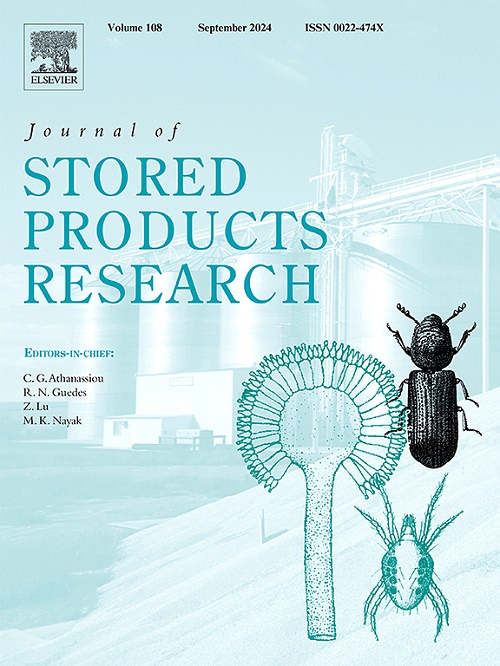The contribution of Escherichia coli to phosphine resistance of Tribolium castaneum (Herbst) (Coleoptera: Tenebrionidae)
IF 2.7
2区 农林科学
Q1 ENTOMOLOGY
引用次数: 0
Abstract
Development of resistance in major stored grain pests to the key fumigant phosphine across the globe has threatened its status as a reliable fumigant. It is urgent to find alternative approaches to control stored grain pests. Knowledge about the mechanism of phosphine resistance will help develop novel pest control strategies. Many studies have shown that symbiotic microbes have positive impacts on host pesticide resistance. As Escherichia coli was isolated from the gut of one strain of Tribolium castaneum (Herbst) (Coleoptera: Tenebrionidae) in our previous study, here we isolated E. coli from phosphine-resistant T. castaneum in order to clarify its relationship with phosphine resistance of T. castaneum. A strain of E. coli isolated from the gut of phosphine-resistant adult T. castaneum significantly increased phosphine resistance of adult T. castaneum. Phosphine exposure had negative transgenerational effects on population fitness and decreased the content of phosphocholine (PC) and phosphatidylethanolamine (PE) of T. castaneum. Inoculation of sterile beetles with E. coli improved population fitness and increased the content of PC, PE, and total lipids of T. castaneum, especially in the presence of phosphine. These results suggest that E. coli increases phosphine resistance of T. castaneum by improving its population fitness, and lipid metabolism regulated by E. coli may play a very important role in it. Further study on the physiological mechanisms that underlie how E. coli regulates host lipid metabolism will help reveal the mechanism of phosphine resistance of T. castaneum.
求助全文
约1分钟内获得全文
求助全文
来源期刊
CiteScore
5.70
自引率
18.50%
发文量
112
审稿时长
45 days
期刊介绍:
The Journal of Stored Products Research provides an international medium for the publication of both reviews and original results from laboratory and field studies on the preservation and safety of stored products, notably food stocks, covering storage-related problems from the producer through the supply chain to the consumer. Stored products are characterised by having relatively low moisture content and include raw and semi-processed foods, animal feedstuffs, and a range of other durable items, including materials such as clothing or museum artefacts.

 求助内容:
求助内容: 应助结果提醒方式:
应助结果提醒方式:


